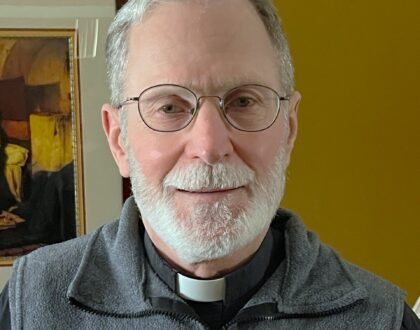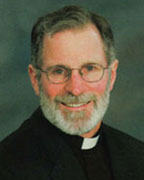Homily, July 23, 2023

From The Pastor
In the acceptance and trust of God’s infinite mercy, how do we understand and respond to sin? Divine love revealed in the redemption of the Cross frees us from the death of sin, but what of human and worldly consequences of sin? We are all sinners. In Christ, we are redeemed sinners as we embrace the truth and mercy of the Lord’s death and Resurrection. Does that close the question on sin and our response to disordered human behavior?
Sin has many faces on every level of human society. Original sin expresses that we are born by nature into a state of sin through the fault of Adam and Eve. Freed from original sin by the grace of Baptism and the acceptance of Christ, we nonetheless are faced with the reality of our human weakness and personal sin. Concupiscence expresses the proneness of human beings to the inclination of sin. St. Paul in his letter to the Romans (7:19ff) captures the essence of this. He says, ‘why do I not do the good that I desire, and instead do the evil that I hate? St. Paul was a saintly man and considered the greatest evangelizer the world has ever known. Still, he admits his sinful nature and his essential need to be saved. “What a wretched man I am. Who can save me from this mortal body? Thanks be to God through our Lord Jesus Christ!”
The mercy of God is most effective and fruitful in the one who admits and confesses their human weakness and the fault of sin. Sin is serious and the danger is that we minimize our sin because of the mercy of God. The mercy of God is freely offered at the cost of the death of the Lord Jesus. It is a death that, in the power of Divine love, defeats the disorder of sin for the sake of conversion and union with God. It is most dangerous to deny our sin, pretend it ‘isn’t that bad,’ hide it from ourselves or others, or blame and project it onto others. These behaviors play into the lie and the deception of the Evil one who seeks our separation from God. Hidden or denied sin is the most dangerous to the soul.
How does this square with the story of the Weeds and the Wheat? God is greater than sin and God will do all that God can do to heal and reconcile the lie of sin and the disorder of evil. But we must cooperate with God in this holy exchange. We can never accomplish this on our own. Redemption is God’s gift given in the union of Divine love. It cannot be earned, merited, gained, or justified by anything we could do. St. Paul points this out in the second reading. ‘The Spirit comes to the aid of our weakness…’ Weakness means our inclination to sin in the reality of our human condition. ‘…but the Spirit himself intercedes with inexpressible groanings. Only with living faith in the Lord Jesus, through the intercessions of the Holy Spirit do our prayers reach the heart of God. These ‘inexpressible groanings’ of the Spirit bring our humble prayers before the Father. The desperation of our need is carried to the Father through the Lord Jesus in the pleadings of the Holy Spirit.
This is the mystery of the weeds and the wheat. The parable conveys the mystery of the patience, wisdom, and the mercy of God. By the grace of God, in faith, we can all bear the fruit of good wheat. While living lives of fruitful discipleship in Christ, we will have our share of weeds. As much as we try with our best efforts, sin will spring up somewhere. Here is the wisdom, patience, and mercy of God.
Divine love chooses to be vulnerable to human sin. God is so humble to even use our sins to save us for the sake of the wheat our faith may produce for the coming Kingdom. “Do you want us to pull up the weeds?” “No, if you pull up the weeds you might uproot the wheat with them. Let them grow together until harvest…”
God understands human weakness and the nature and kind of every sin. God knows your heart, mind, body, and soul. Jesus knows Peter will sin by his betrayal of the Lord. Why does Jesus allow him to do it despite the pain it will cause both Jesus and Peter? The sin of that denial becomes the fruit of Peter’s conversion and his full surrender to the Lord’s redemptive love. These kinds of stories abound throughout scripture. David the adulterer, Moses the murderer, the arrogance of James and John, the good thief on the cross, the adulterous woman…
Does this mean God is easy on sin. No. It means God understands, is patient, and merciful. True mercy is realized in the mature believer who owns and admits their sin. Not so much in the one who denies, hides, or pretends sin is not there. Too often we justify our sin in comparison to the sins of others. Big mistake.
Redemption is the singular act of the dying and rising of Jesus. Salvation is how we embrace, in faith, the working out of our lives in Christ day by day. If sin is a competition, then I only have to be one sin better than the next guy. Stupid. Immature. Salvation trusts the mercy of God in the forgiveness of my sin, the weeds in my wheat, as I encourage and support other sinners around me as we journey together to the Kingdom. Resist sin. Confess. Forgive yourself. Let God forgive you. Live with love for others in all their weeds. Those weeds might be for their salvation and yours.
Father John Esper
Recent Sermons

Homily, March 30, 2025
March 27, 2025

Homily, March 23, 2025
March 20, 2025

Homily, March 16, 2025
March 11, 2025

